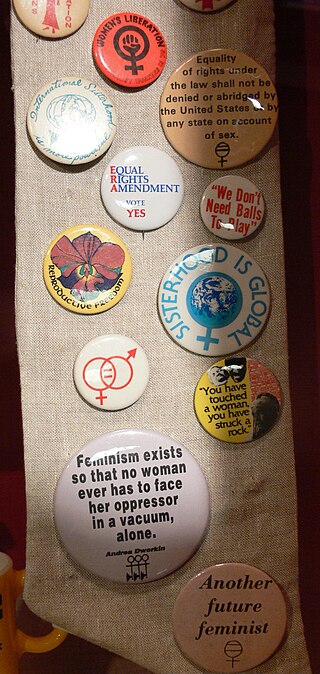Related Research Articles
Radical feminism is a perspective within feminism that calls for a radical re-ordering of society in which male supremacy is eliminated in all social and economic contexts, while recognizing that women's experiences are also affected by other social divisions such as in race, class, and sexual orientation. The ideology and movement emerged in the 1960s.
Triple oppression, also called double jeopardy, Jane Crow, or triple exploitation, is a theory developed by black socialists in the United States, such as Claudia Jones. The theory states that a connection exists between various types of oppression, specifically classism, racism, and sexism. It hypothesizes that all three types of oppression need to be overcome at once.

Gloria Jean Watkins, better known by her pen name bell hooks, was an American author and social activist who was Distinguished Professor in Residence at Berea College. She is best known for her writings on race, feminism, and class. The focus of hooks's writing was to explore the intersectionality of race, capitalism, and gender, and what she described as their ability to produce and perpetuate systems of oppression and class domination. She published around 40 books, including works that ranged from essays and poetry to children's books. She published numerous scholarly articles, appeared in documentary films, and participated in public lectures. Her work addressed love, race, class, gender, art, history, sexuality, mass media, and feminism.
Identity politics is a political approach wherein people of a particular race, nationality, religion, gender, sexual orientation, social background, social class, or other identifying factors develop political agendas that are based upon these identities. Identity politics is deeply connected with the idea that some groups in society are oppressed and begins with analysis of that oppression. The term is used primarily to describe political movements in western societies, covering nationalist, multicultural, women's rights, civil rights, and LGBT movements.
Individualist feminism is a libertarian feminist tradition that emphasizes individualism, personal autonomy, choice, consent, freedom from state-sanctioned discrimination against women, and equality under the law. It also opposes what is considered political or gender feminism.

Lesbian feminism is a cultural movement and critical perspective that encourages women to focus their efforts, attentions, relationships, and activities towards their fellow women rather than men, and often advocates lesbianism as the logical result of feminism. Lesbian feminism was most influential in the 1970s and early 1980s, primarily in North America and Western Europe, but began in the late 1960s and arose out of dissatisfaction with the New Left, the Campaign for Homosexual Equality, sexism within the gay liberation movement, and homophobia within popular women's movements at the time. Many of the supporters of Lesbianism were actually women involved in gay liberation who were tired of the sexism and centering of gay men within the community and lesbian women in the mainstream women's movement who were tired of the homophobia involved in it.

Marxist feminism is a philosophical variant of feminism that incorporates and extends Marxist theory. Marxist feminism analyzes the ways in which women are exploited through capitalism and the individual ownership of private property. According to Marxist feminists, women's liberation can only be achieved by dismantling the capitalist systems in which they contend much of women's labor is uncompensated. Marxist feminists extend traditional Marxist analysis by applying it to unpaid domestic labor and sex relations.
Socialist feminism rose in the 1960s and 1970s as an offshoot of the feminist movement and New Left that focuses upon the interconnectivity of the patriarchy and capitalism. However, the ways in which women's private, domestic, and public roles in society has been conceptualized, or thought about, can be traced back to Mary Wollstonecraft's A Vindication of the Rights of Woman (1792) and William Thompson's utopian socialist work in the 1800s. Ideas about overcoming the patriarchy by coming together in female groups to talk about personal problems stem from Carol Hanisch. This was done in an essay in 1969 which later coined the term 'the personal is political.' This was also the time that second wave feminism started to surface which is really when socialist feminism kicked off. Socialist feminists argue that liberation can only be achieved by working to end both the economic and cultural sources of women's oppression.

Intersectionality is an analytical framework for understanding how aspects of a person's social and political identities combine to create different modes of discrimination and privilege. Intersectionality identifies multiple factors of advantage and disadvantage. Examples of these factors include gender, caste, sex, race, ethnicity, class, sexuality, religion, disability, weight, and physical appearance. These intersecting and overlapping social identities may be both empowering and oppressing.
Black feminism is a philosophy that centers on the idea that "Black women are inherently valuable, that [Black women's] liberation is a necessity not as an adjunct to somebody else's but because of our need as human persons for autonomy."

Barbara Smith is an American lesbian feminist and socialist who has played a significant role in Black feminism in the United States. Since the early 1970s, she has been active as a scholar, activist, critic, lecturer, author, and publisher of Black feminist thought. She has also taught at numerous colleges and universities for 25 years. Smith's essays, reviews, articles, short stories and literary criticism have appeared in a range of publications, including The New York Times Book Review, The Black Scholar, Ms., Gay Community News, The Guardian, The Village Voice, Conditions and The Nation. She has a twin sister, Beverly Smith, who is also a lesbian feminist activist and writer.
Redstockings, also known as Redstockings of the Women's Liberation Movement, is a radical feminist nonprofit that was founded in January 1969 in New York City, whose goal is "To Defend and Advance the Women's Liberation Agenda". The group's name is derived from bluestocking, a term used to disparage feminist intellectuals of earlier centuries, and red, for its association with the revolutionary left.
The Combahee River Collective was a Black feminist lesbian socialist organization active in Boston from 1974 to 1980. The Collective argued that both the white feminist movement and the Civil Rights Movement were not addressing their particular needs as Black women and more specifically as Black lesbians. Racism was present in the mainstream feminist movement, while Delaney and Manditch-Prottas argue that much of the Civil Rights Movement had a sexist and homophobic reputation.
Beverly Smith in Cleveland, Ohio, is a Black feminist health advocate, writer, academic, theorist and activist who is also the twin sister of writer, publisher, activist and academic Barbara Smith. Beverly Smith is an instructor of Women's Health at the University of Massachusetts Boston.

A variety of movements of feminist ideology have developed over the years. They vary in goals, strategies, and affiliations. They often overlap, and some feminists identify themselves with several branches of feminist thought.
The personal is political, also termed The private is political, is a political argument used as a rallying slogan of student movement and second-wave feminism from the late 1960s. In the context of the feminist movement of the 1960s and 1970s, it was a challenge to the nuclear family and family values. The phrase was popularized by the publication of a 1969 essay by feminist Carol Hanisch under the title "The Personal is Political" in 1970, and has been repeatedly described as a defining characterization of second-wave feminism, radical feminism, women's studies, or feminism in general. It has also been used by some women artists as the underlying philosophy for their art practice.

The International Socialist Organization (ISO) was a Trotskyist group active primarily on college campuses in the United States that was founded in 1976 and dissolved in 2019. The organization held Leninist positions on imperialism and the role of a vanguard party. However, it did not believe that necessary conditions for a revolutionary party in the United States were met; ISO believed that it was preparing the ground for such a party. The organization held a Trotskyist critique of nominally socialist states, which it considered class societies. In contrast, the organization advocated the tradition of "socialism from below." as articulated by Hal Draper. Initially founded as a section of the International Socialist Tendency (IST), it was strongly influenced by the perspectives of Draper and Tony Cliff of the British Socialist Workers Party. It broke from the IST in 2001, but continued to exist as an independent organization for the next eighteen years. The organization advocated independence from the U.S. two-party system and sometimes supported electoral strategies by outside parties, especially the Green Party of the United States.
Ecofeminism is a branch of feminism and political ecology. Ecofeminist thinkers draw on the concept of gender to analyse the relationships between humans and the natural world. The term was coined by the French writer Françoise d'Eaubonne in her book Le Féminisme ou la Mort (1974). Ecofeminist theory asserts a feminist perspective of Green politics that calls for an egalitarian, collaborative society in which there is no one dominant group. Today, there are several branches of ecofeminism, with varying approaches and analyses, including liberal ecofeminism, spiritual/cultural ecofeminism, and social/socialist ecofeminism. Interpretations of ecofeminism and how it might be applied to social thought include ecofeminist art, social justice and political philosophy, religion, contemporary feminism, and poetry.

Chandra Talpade Mohanty is a Distinguished Professor of Women's and Gender Studies, Sociology, and the Cultural Foundations of Education and Dean's Professor of the Humanities at Syracuse University. Mohanty, a postcolonial and transnational feminist theorist, has argued for the inclusion of a transnational approach in exploring women’s experiences across the world. She is author of Feminism Without Borders: Decolonizing Theory, Practicing Solidarity, and co-editor of Third World Women and the Politics of Feminism, Feminist Genealogies, Colonial Legacies, Democratic Futures, Feminism and War: Confronting U.S. Imperialism,, and The Sage Handbook on Identities.
White feminism is a term which is used to describe expressions of feminism which are perceived as focusing on white women but are perceived as failing to address the existence of distinct forms of oppression faced by ethnic minority women and women lacking other privileges. The term has been used to label and criticize theories that are perceived as focusing solely on gender-based inequality. Primarily used as a derogatory label, "white feminism" is typically used to reproach a perceived failure to acknowledge and integrate the intersection of other identity attributes into a broader movement which struggles for equality on more than one front. The term has also been used to refer to feminist theories perceived to focus more specifically on the experience of white, cisgender, heterosexual, able-bodied women, and in which the experiences of women without these characteristics are excluded or marginalized. This criticism has predominantly been leveled against the first waves of feminism which were seen as centered around the empowerment of white middle-class women in Western societies.
References
- ↑ "Haymarketbooks.org". Archived from the original on March 4, 2008.
- ↑ Smith, Sharon (Spring 1994). "Mistaken identity—or can identity politics liberate the oppressed?". International Socialism. No. 62. Retrieved February 5, 2017.
- ↑ Feld, Nicola. "Identity and the Lifestyle Market". In Rosemary Hennessy and Chrys Ingraham (Eds.) Materialist Feminism: A Reader in Class, Difference, and Women's Lives. New York and London: Routledge, 1997. P. 266. ISBN 0-415-91634-8, ISBN 978-0-415-91634-9
- ↑ Di Leonardo, Micaela. "White Ethnicities, Identity Politics, and Baby Bear's Chair". Social Text . No. 41. (Winter 1994). pp. 165–191. Retrieved March 17, 2009. JSTOR 466837
- ↑ "Haymarketbooks.org".
- ↑ "Haymarketbooks.org". Archived from the original on April 21, 2008.